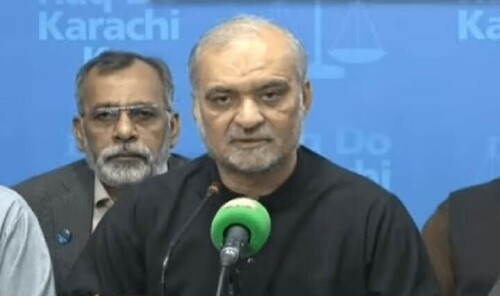Officials privy to the move said the proposal was developed by former Sindh IG Iqbal Mehmood Khan who wanted a ‘strong but independent’ intelligence unit in the police to monitor the areas for which the assistance of federal agencies was mostly sought.
“For this purpose, a wing of the Special Branch has been established. It will be headed by a superintendent of police for surveillance and intelligence,” said a source aware of the development.
“Comprising between 50 and 60 personnel, the unit will be based initially in Karachi. Then it may further be expanded to other cities.
“A comprehensive intelligence programme with the assistance of foreign agencies is being planned,” he said.
Apart from other jobs, the source added, the intelligence wing would also focus on activities of frequent visitors to Karachi or other parts of the province.
He said the move was not to harass anyone or discourage them from their activities but to keep a watchful eye on work and objectives of the people who visited the metropolis or other urban areas of Sindh quite often.
“Under the rules, currently citizens of some 15 countries, including India, have to report to police on their arrival. The intelligence unit will not only monitor visitors of these 15 countries but will also cover activities of other foreign visitors,” added the source.
He said the move was part of the recently launched capacity-building programme by police that focused on investigation and intelligence areas of the law-enforcement agency.
The newly proposed unit would also serve as community intelligence wing for the police and forward reliable information to police stations facilitating regular policing, he added.
“As you know that the Sindh police are increasingly engaging themselves with foreign experts under institutional capacity-building programmes, with Americans teaching bomb disposal techniques to them, Germans making them aware of the latest trends in regular policing and Australians equipping police investigators with forensic probe skills. A training programme for the personnel of intelligence unit is being designed,” he added.
“Apart from improving intelligence wing of the law-enforcement agency, some 200 inspectors are being hired only to be posted in the investigation section of the Sindh police.
“They will be trained as investigation officers, with all necessary syllabus and training manuals especially designed for that purpose. But it has not been made part of the conventional police training yet,” he added.
The Sindh government had made a ‘special allocation’ of Rs4.65 billion for the police in their budget 2014-15 solely for the operational requirements of the law-enforcement agency. According to the budget document, the ‘special allocation’ will be used for recruitment, training, procurement of arms, vehicles and other necessary equipment for the police.
Published in Dawn, July 8th , 2014












































